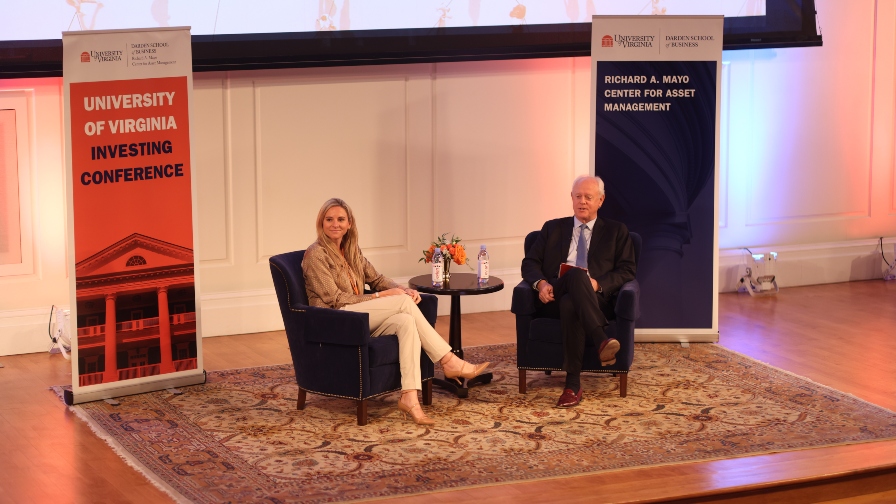
University of Virginia Investing Conference: Transient Troubles or a Lost Decade?
By Dave Hendrick
The 15th Annual University of Virginia Investing Conference unfolded against a backdrop of economic uncertainty and tumult, with soaring inflation and sagging equity markets juxtaposed with economic expansion and record low unemployment.
The annual conference, held at the University of Virginia Darden School and hosted by the Richard A. Mayo Center of Asset Management, brought together a range of leading investment professionals, investors and policy experts to discuss the unusual present and potential future.
One sentiment echoed by multiple speakers was the likely enduring economic softness in multiple areas. Elizabeth Burton, managing director of client solutions and capital markets at Goldman Sachs Asset Management, said she believed a recession was coming and the inflationary pressures would remain “sticky for a long time.”
Burton, who previously served as chief investment officer of the Employees Retirement System of the State of Hawaii, where she oversaw $19 billion in assets, said she feared the 2020s could be a “lost decade” for investors and cautioned that there could be a “reckoning” in the seemingly resilient employment figures if an economic slowdown intensifies.
Not that it’s time to panic, of course; Burton, who was in conversation with Makena Capital Management Chief Investment Officer Larry Kochard, said long-term investors should “act like it,” but also consider areas where a portfolio has historically been underweight. Interesting areas for exploration could include China, which Burton said had gone from a “growth to value story.” As for other geographies, geopolitical risk may already be factored into markets such as Brazil and South Korea, Burton said.
While Burton said there were asset classes she found compelling at the moment, citing global macro and quant macro funds in particular, she said her outlook was generally bearish in the near-term amid rising interest rates, inflation and other macroeconomic headwinds.
Jan van Eck, CEO of VanEck, an investment manager with assets under management of more than $70 billion, said investors were in “the worst position we can be in” in regard to financial assets at the moment, and if the Federal Reserve sticks to its stated intention of reducing the size of its balance sheet, “that is an ugly neighborhood to be in.”
The CEO also predicted a potentially stubborn inflationary environment. While commodity prices always “mean revert over time,” wages will likely continue to meaningfully drive inflation, he said
Noting that inflation in services was “raging,” van Eck, who was in conversation with Darden Professor and Dean Emeritus Bob Bruner, said it was unclear how long it would take for such spikes to work their way through the economy. An advocate of studying history to help inform investment strategies, van Eck said “recency bias” was endemic in the financial market, and said we were operating in an era of few clear precedents and without a clear roadmap for how the year ahead would play out, particularly given the unusual nature of the labor market related to the pandemic.
“The economy is doing great right now. We have full employment,” van Eck said. “It’s just the financial markets that aren’t doing well.”
As a firm, VanEck was an early adopter of ETFs and is focused on innovation and disruption; they currently offer a range of ETFs with exposure to cryptocurrencies. Even if the typical investment professional doesn’t embrace the space, it was important to understand it, van Eck said, noting that cryptocurrency clearly competes with existing investments, be it Bitcoin competing with gold or Ethereum with network systems such as Oracle.
Calling himself “more a businessman than a portfolio manager,” van Eck said investors needed “a very broad radar screen in terms of what is happening in the world.”
In addition to embracing new technologies, the CEO is bullish in the near-term on bonds and many commodity equities given their relatively low price.
In addition to investing ideas, Cornell University Professor Eswar Prasad discussed his latest book, The Future of Money: How the Digital Revolution is Transforming Currencies and Finance, outlining how certain digital currencies are already effective competitors in the payment space, whereas Bitcoin has emerged as a speculative financial asset.
While innovation in the area will continue apace, Prasad predicted that the dollar would remain the dominant global currency, in part because “the world still needs safe place to put money in times of financial turmoil.”
Michael Howell, CEO of CrossBorder Capital, also said the dollar was a safe haven at present. Howell, whose firm specializes in global liquidity flows, noted how the global pool of global liquidity drives asset prices and that it moves in cycles over time. During 2022, global liquidity has been contracting sharply and currently appears to be approaching a low point in the current cycle.
He further discussed how liquidity tends to lead financial markets and as liquidity eventually returns to the market in the next up cycle, the real economy will improve along with corporate earnings and equity prices.
The annual investing conference also included a tribute to Bruner, who was instrumental in launching and sustaining both the conference and the Mayo Center for Asset Management. Presenting the Darden dean emeritus with the Mayo Center Distinguished Service Award, Dick Mayo (MBA ‘68) lauded the former dean of the Darden School as one “the great teachers” who instilled a drive for constant learning.
Bruner, who plans to retire from full-time teaching at the end of the academic year, had the key insight that Darden could play a role in helping the world better understand financial markets through scholarship and teaching, Mayo said, and in bringing together the worlds of the academic and practice.
The University of Virginia Darden School of Business prepares responsible global leaders through unparalleled transformational learning experiences. Darden’s graduate degree programs (MBA, MSBA and Ph.D.) and Executive Education & Lifelong Learning programs offered by the Darden School Foundation set the stage for a lifetime of career advancement and impact. Darden’s top-ranked faculty, renowned for teaching excellence, inspires and shapes modern business leadership worldwide through research, thought leadership and business publishing. Darden has Grounds in Charlottesville, Virginia, and the Washington, D.C., area and a global community that includes 18,000 alumni in 90 countries. Darden was established in 1955 at the University of Virginia, a top public university founded by Thomas Jefferson in 1819 in Charlottesville, Virginia.
Press Contact
Molly Mitchell
Senior Associate Director, Editorial and Media Relations
Darden School of Business
University of Virginia
MitchellM@darden.virginia.edu




